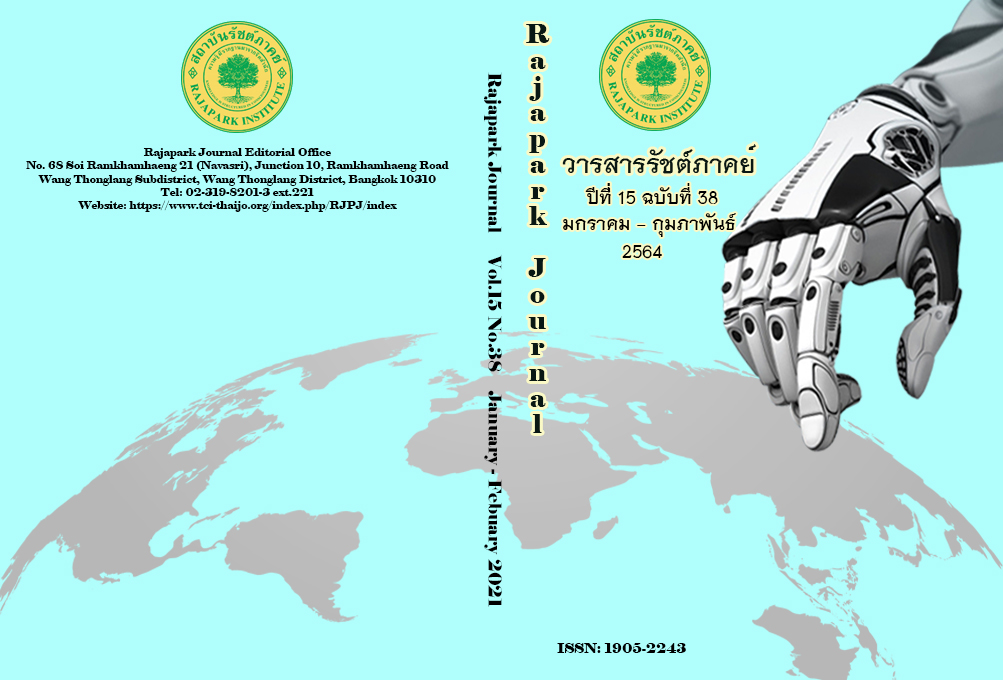A Study of Internet Addiction among College Student: Quality of Life and other Factors
Main Article Content
Abstract
The objectives of this research were 1) to study the relationship between the internet addiction of students and their quality of life, 2) to study the relationship between personal factors and internet addiction in students, 3) to study the relationship between the internet addiction and monthly allowance and hour of internet used per day by the students. The sample size were 400 students yielded from stratified random sampling. Research tools were a personal data questionnaire, Young’s internet addiction test (YIAT20), and WHO’s Quality of life evaluation form in Thai (WHOQOL-BREF-THAI). Result: Students’ internet addiction had inverse correlation with quality of life (rxy = -.178, p = .001). Students had mild internet addiction ( = 48.10, SD. = 12.16). and moderate quality of life (
= 87.71, SD. = 12.30). Students’ internet addiction correlated to checking e-mail behavior, online gambling, online game, online pornography, personal video upload, and year level of study. Conclusion: Student’s internet addiction correlated to year level of study, checking e-mail behavior, online gambling, online game, online pornography, personal video upload, and quality of life. The more severity internet addiction the lower quality of life but internet addiction and quality of life did not have a relationship to monthly allowance and duration of internet used per day by students.
Article Details
Views and opinions appearing in the Journal it is the responsibility of the author of the article, and does not constitute the view and responsibility of the editorial team.
References
American Psychiatric Association. (2013). Diagnostic and Statistical Manual of Mental Disorders (DSM–5) (5th ed.). Arlington, VA: American Psychiatric Publishing.
Chatraphorn, S., et al. (2009). Quality of life of college students holding part-time employment: Final research report: Kasetsart University research fund fiscal year 2008. Bangkok: Faculty of Education Kasetsart University.
Chern, K. C., & Huang, H. J. (2018). Internet addiction: Associated with lower health-related quality of life among college students in Taiwan, and in what aspects. Computers in Human Behavior, 84, 460-466. https://doi.org/10.1016/j.chb.2018.03.011
Electronic Transactions Development Agency (Public Organization) (ETDA). (2019). Thailand Internet User Profile 2018. Strategy Bureau, ETDA: Ministry of Digital Economy and Society.
Jantaraumporn, S., & Kaewchinda, M. (2016). Current Situation and Enhancement of social Media Online Literacy Among Adolescents Journal of Graduate Studies Valaya Alongkorn Rajabhat University, 10(1), 83-93.
Laorungruang, J. (2018). The Internet Using Behavior and Learning Achievement A Case Study: Rajamangala University of Technology Phra Nakhon Students. Master of Science, Information Technology Policy and Management Program. Innovation College Thammasat University.
Pornnoppadol, C., & Vasupanrajit, A. (2015). “Internet Addiction” In Siriraj Psychiatry, DSM-5. Bangkok: Faculty of Medicine Siriraj Hospital, Mahidol University.
Ragheb, B. M. et al. (2018). Internet Addiction and Quality of Life among Students at Technical Institute of Nursing, Mansoura University, Egypt. International journal of Nursing Didactics, 8(9), 11-18. https://doi:10.15520/ijnd.v8i09.2290
Tapanadechopone, P. (2012). IAD: Internet Addiction Disorder. Thammasat Medical Journal, 12(3), 599-608.
Tupiya, K. (2017). Behavior on The Use of The Internet and Information Technology Among University Students in Burapha University. Master of Public Administration Department of Public and Private Management. Burapha University.
Saroj, R. (2004). Classification of internet addiction groups of students Bachelor's Degree Khon Kaen University. Master of Science. Khon Kaen University.
Thoongkaew, P. (2017). Internet Using Behavior of Students, Faculty of Education Buriram Rajabhat University. Naresuan Research Conference 13th: Technology and Innovation Driving Economics and Society, 1199-1206.
Uraiwan, P. et al. (2019). The relationships between Personal factors Internet Utilization and Depression of Nursing Students of Boromarajonani College of Nursing, Suratthani. Journal of Health Research andInnovation, 2(1), 12-24.
Wongkaewpotong, O. (2011). Internet addiction of online communities. Executive Journal 31(3), 39-42.
Young, K. S. (1998). Internet addiction: The emergence of a new clinical disorder. Cyber Psychology & Behavior, 1(3), 237–244. https://doi.org/10.1089/cpb.1998.1.237


